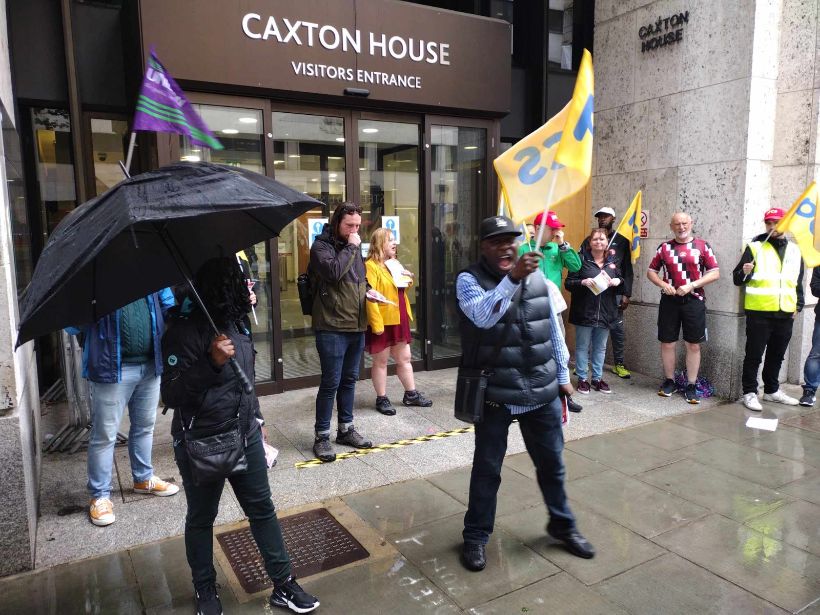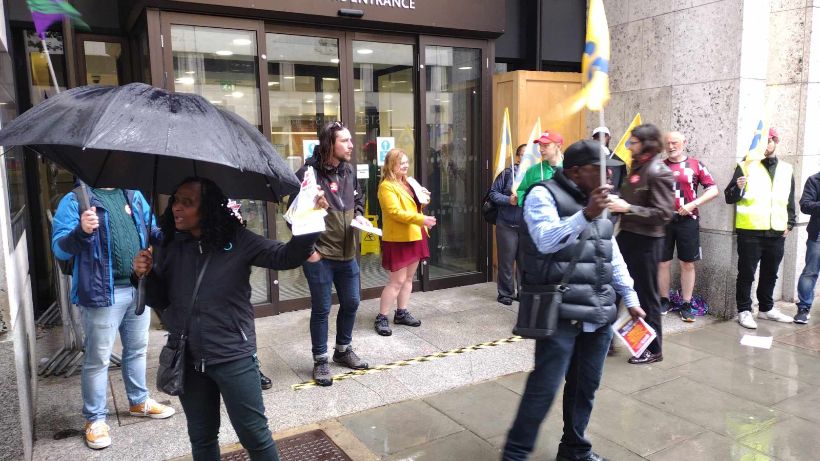The incoming Labour government has been warned that the Department for Work and Pensions is “sleepwalking” into a potential major safety incident.
At a protest by G4S security guards who work at Caxton House, the department’s HQ, PCS vice president Martin Cavanagh said security guards working at DWP offices and job centres are “putting their bodies on the line for minimum wage” and urged Labour to bring the jobs back in-house.
“We've seen a sharp increase in the amounts of incidents, attacks on both guards and DWP staff, threats being made by the public against DWP staff,” Cavanagh said. “If it wasn't for the safety that these guys provide, then we would be simply in an even worse situation than we are now. These people literally are putting their bodies on the line day in day out for minimum wage and that cannot continue.”
Cavanagh said “more and more guards have been telling [PCS] that they're looking for alternative work” and “more and more are having to take time off work through stress and sickness”.
“Some have been assaulted and therefore physically are having to take time off work,” he added.
“Our members themselves working in the DWP, protected by the G4S guards, are also seeing record levels of absence and record levels of stress and that is all because of the social security system,” Cavanagh said.

“Under the Tories, a very hard and punitive security regime has inevitably penalised the public and those who desperately need financial support,” Cavanagh said. “And so, as a result of that, the frustration has rolled over and we’ve started seeing a rise in safety incidents and reported incidents as well.”
Cavanagh urged the incoming government and the department “to take this seriously”, warning, “we are sleepwalking into a major incident in one of these DWP offices and, if something isn't done soon, we are going see a serious incident that the department will struggle to recover from”.
The PCS vice president said G4S has been “looking to reduce the number of guards that are in workplaces”, which he said is “unsafe, dangerous and negligent”. Ne added that the company has been illegally bringing in agency workers who are not fully trained to staff desks and provide security. He said DWP, as the contracting authority, needs to “get a grip”.
The guards on the picket line at Caxton House this morning, who work at the DWP HQ but are employed by G4S and are members of the PCS union, joined hundreds walking out today in job centres across the country in strikes organised by PCS and GMB over pay and conditions.
Marilyn, one of these Caxton House security guards, told CSW: “We’re here at the front desk representing the DWP. We have the secretary of state, all the ministers coming here, but they don’t know that we are protecting them and we are on minimum wage.”
“We’re asking for insourcing for our staff, better pay, better conditions,” she added.
 'Keir Starmer, keep to your word': Marilyn, left, leads calls for better pay, better conditions at Caxton House protest
'Keir Starmer, keep to your word': Marilyn, left, leads calls for better pay, better conditions at Caxton House protest
PCS is seeking a minimum wage of £15 an hour for all civil servants across government. It also wants to see Labour follow through on its commitment to “the biggest wave of insourcing in a generation”.
Chris Marks, a civil servant who works at Caxton House and who is also a PCS rep in the DWP, told CSW: “We're hoping for resolution from the employer. But we are also aware that the incoming Labour government does have a policy of insourcing government contracts. And so we're hoping that they cut all of the profit that's usually made on those contracts and invest that money in training and pay and terms and conditions.”
PCS does not have a recognition agreement with PCS for the G4S security guards – GMB is the union that undertakes collective bargaining on behalf of the employees .
G4S said it has offered staff a 6.5% pay rise from April 2023, and an average 9.3% rise from December 2023 to April 2024. It said this is its “best and last offer” and that GMB refused to put it to a vote by its members. G4S said it has made 12 pay offers since 2022 and that the GMB has taken only two to a ballot.
A G4S spokesperson said: "Our dedicated security colleagues do a great job and support an essential public service, sometimes in difficult circumstances. The majority of our staff have not been on strike.
“We urge the union to present our offer to our employees, which is above minimum wage and inflation. We want to give our staff a pay rise and are keen to bring this dispute to an amicable conclusion.”